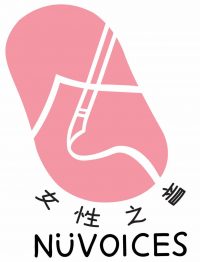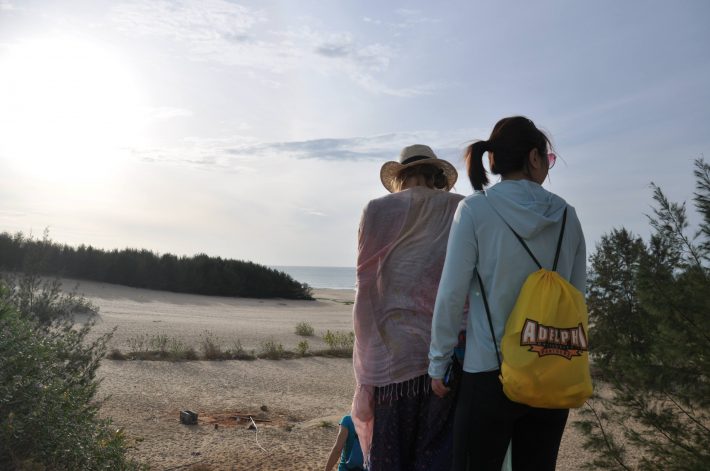BY ALICE XIN LIU
I fell for Ostrich. I, a woman married to a man, fell for a woman. And it was one of the most amazing experiences…
PING, a message came in: it was from Ostrich: I jumped. I hadn’t felt this shift in a long time. The time I shared with my husband had started to feel non-essential. PING: I’m going running here, I’m in Changsha. PING: I’m thinking about you. PING: leave me alone. PING: Come along to Changsha. PING: I call this “proffering one’s body for sex across the country.” PING: stop sending me so many voice messages.
For all my worth, this is starting to sound like Vita Sackville-West and Virginia Woolf, with me being Virginia. PING: I just got back, C. is tired. I’m tired. It was hard saying goodbye. I just read the post you posted on your public WeChat feed, Moments. I love you in your high school uniform. PING: that’s nice, but goodnight, Go to sleep. Goodnight.
The next morning things were tough. She had realized her feelings for C. and it was not a sad goodbye, it was a feeling of love. In retrospect, there were many warning signs, including what I saw on her Moments—“It is better to biaobai, profess your love, than to say nothing; fewer tricks, more honesty!” She had used both of us at the same time, she had only left crumb-like clues.
I didn’t know about the temporary insanity that had beset me. In hindsight it was obvious. People tended to think of life as a continuum, as if we’re riding a monorail down a slope. We believe that we can see madness coming around the corner, as if it were our first time.
I had met her through C. C. was the hot girl in the running club. I was the new girl. The first time I met Ostrich, at a local 5K, she was smiling a half-moon as white as tiles, a veritable Beijing Annemarie Schwarzenbach. I continued talking to C. I’d noticed later, once we’d already started the race, Ostrich had swapped her glasses for prescription sunglasses.
I needed someone to talk to about the other bitches. But first of all I said to you: it’s not fair for me, you’re married. You told me you could do both. A Greek philosopher once said it’s better to suffer an injustice than to commit one. My husband and my best friend tried to warn me about you: you were gaslighting me; I was playing with fire, but I had a swelling up of emotion that became a shield against your detractors. It was a defense against injustice, even though the injustices were committed against me. My mum had committed injustices against me all my life, and I guess I was used to it.
I remember saying: you’re trying to control me and C. And it’s not the first time, I’ll sleep with whoever I want. If you keep doing this I’ll try even harder. I might be really angry right now but I mean everything I say. Let’s go back to being friends without the sex and the emotional thing. I don’t want another relationship full of lies. That way you can also start fucking other people.
Then you said: After you came back from Changsha, I had seen on your Moments that you cooked for C. at her house. Then, this: “It is better to biaobai than to say nothing; fewer tricks, more honesty!” The picture showed potatoes and eggplants.
You implied my comment was rich. Then you blocked me from your account. I made a mess of myself running hard the next two days. I screamed “fuck you” in my head. It had become an infatuation. How could you take it all back so suddenly? I’ve always hated exposing myself publicly, yet I updated my Moments with “Personal Bests”—I knew you could see it—every day for a week.
As a child I had stayed silent for most of the time. I felt most fine on my own, the stereotypical image of an only child.
The irony though is, after I grew up, I assumed that the sun, the lights revolved around me.
You turned your body towards me, a bare leg stacked heavy. You loomed large, on the duvet. You weren’t wearing underpants. “I have a big thorn in my heart,” you said. “And it is not you.”
The last thing I said to you was: “Neither of us can run away from this, and I’ve always wanted to find someone just like me.”
About the author
Alice Xin Liu is Vice Chair and Translation Director of NüVoices. She is a writer and translator living in Beijing. Born in China, she left aged seven and was educated in Britain, graduating from Durham University studying English Literature. Since arriving in Beijing in 2007 she has worked as a translator for the Guardian, China Editor for Index on Censorship, editor and translator at the Financial Times-affiliated Danwei.org, and as Managing Editor of bilingual literary magazine Pathlight: New Chinese Writing, editing the work of literature in translation from Chinese to English. As a literary translator Alice has translated two books of Chinese literature: The Letters of Shen Congwen (Yilin Publishing House) and The Problem with Me: And Other Essays on Making Trouble in China by Han Han (Simon and Schuster). Her freelance writings have appeared in n+1, Granta, the Guardian, Asymptote and numerous other places.

